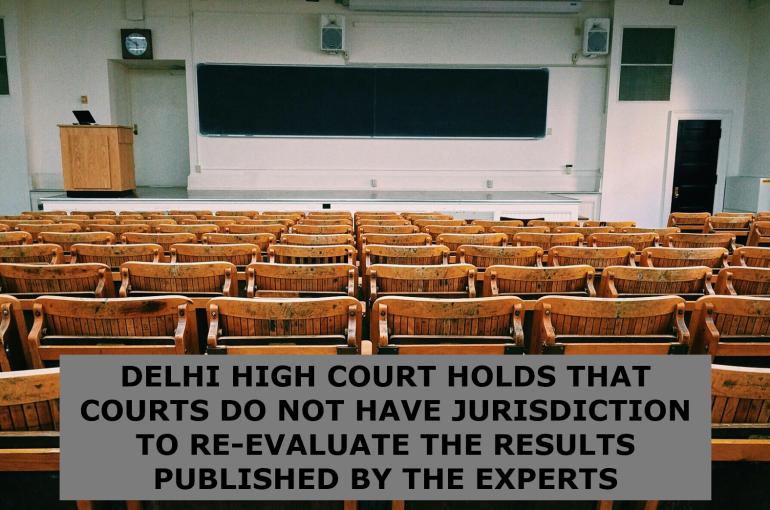DELHI HIGH COURT HOLDS THAT COURTS DO NOT HAVE JURISDICTION TO RE-EVALUATE THE RESULTS PUBLISHED BY THE EXPERTS
A single Judge Bench of Delhi High Court comprising of Justice Swarana Kanta Sharma passed a judgement dated 08.08.2024 in Nivrithi Bathla v. National Testing Agency and Anr. W.P. (C) 10585/2024 wherein the Hon’ble Bench held that it is not within the jurisdiction of Courts to re-evaluate the results published by the experts in academic matters.
Facts
The Petitioner filed a Writ Petition under Article 226 of the Constitution of India (Power of High Courts to issue certain writs) against the National Testing Agency (NTA) related to the results of Common University Entrance Test (CUET) for undergraduate admission in colleges in 2024. In her CUET (UG)-2024 appearance, the Petitioner expressed particular concerns about the inconsistency between the Accountancy paper, the instructions given in the examination question, the Information Bulletin and the Answer Key published by NTA. The Petitioner contested the accuracy of the answer key, especially with regard to Test Booklet Code “A” Questions Nos. 7 and 22. The Petitioner provided that one of the questions of the exam was ambiguous and both option 1 and 2 were right for the question as per the NCERT book.
The counsel for the Petitioner argued that, based on the most recent NCERT textbook, alternatives 1 and 2 were valid for Question no. 22 and that the solution to Question No. 7 was erroneously evaluated. Furthermore, the Petitioner claimed that Question No. 22 included two right answers that went against the NCERT textbook, which caused adverse impact on the Petitioner’s score.
The Petitioner contended that evaluation by NTA of these matters was done in arbitrary manner, and produced unjust outcomes that infringed upon the rights of candidates.
On the other hand, the Respondent provided that the Petitioner who is claiming for an ambiguous question did not attempt the Question no. 22 and thus the Petitioner do not have a stand to challenge the marking of that question. Moreover, NTA provided that the answers were reviewed by the subject experts, who subsequently confirmed that ‘option no. 2’ was correct.
Furthermore, the counsel for the Respondent contended that in the cases of such ambiguity, the Information Bulletin of the exam provides that both the alternatives in question will be termed as correct and marks will be provided for both.
Issues
- Whether the assessment done by the NTA was incorrect and arbitrary in nature?
- Whether the Petitioner was entitled for appropriate marks and her claim to re-publish the scores of CUET-24 was correct?
Decision by the Hon’ble High Court
The Hon’ble Court noted that the Petitioner cannot claim that the marking of Question No. 22 had a negative impact on the score because the Petitioner did not attempt it. Since the Petitioner lacked locus standi in this context, it was determined that the Petitioner’s claims of the unfair advantage enjoyed by those who responded to the question were unfounded.
Moreover, the Hon’ble Bench also relied on the opinion of the subject experts who had reviewed the questions and reached the conclusion regarding the confusion related to Question no. 22. Following that, the Hon’ble Court held that, particularly in cases where expert opinions have been presented, it is not within the jurisdiction of judges to re-evaluate the accuracy of academic assessments.
The High Court of Delhi also referred to the judicial precedents provided by the Hon’ble Supreme Court where the Court emphasized that intervention of Courts in academic matters should be limited. Relying on the judgement of Kanpur University v. Samir Gupta (1983) 4 SCC 309, wherein the Apex Court held that unless an answer key is demonstrably incorrect on the face of it, Courts should not interfere with the decisions made by academic experts.
The Apex Court also relied on the judgement of Wajda Tabasuum v. NTA, W.P.(C) 1260/2021 wherein the Hon’ble Supreme Court decided that as the answers had already been reviewed by a committee consisting of three subject matter experts, it would be outside the purview of the Court to conduct another exercise in evaluating their validity. Also, the onus is on the person challenging that the answer key is incorrect.
Therefore, after considering the judicial precedents and the opinion of the subject experts, the Hon’ble High Court of Delhi held that the final answer key provided by the NTA is correct and final. Moreover, as the Petitioner did not attempt the Question in dispute, there is no point of re-evaluating the answer key published by NTA. Thus, there is no locus standi to challenge the marking of Question no. 22 of the exam held on 17.05.2024. Therefore, the Hon’ble Bench dismissed the Civil Writ Petition bearing no. 10585/2024 and thus, the relief prayed by the Petitioner cannot be granted.
Conclusion
The Hon’ble Delhi High Court by relying on the assessment of the NTA, held that the evaluation done by the Respondent was correct and reiterated that it is not within the purview of Courts to re-evaluate the answer sheets once the assessment is done by experts.
ARJAV JAIN
ASSOCIATE
THE INDIAN LAWYER & ALLIED SERVICES





































Leave a Reply